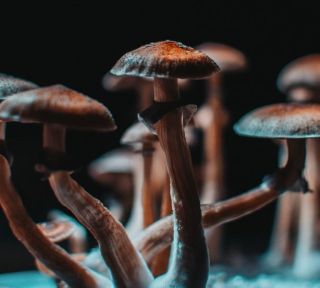KEY POINTS-
- A study found psilocybin resulted in a sustained reduction in symptoms of major depressive disorder (MDD).
- Psilocybin is a mind-altering chemical, similar in action to lysergic acid diethylamide (LSD).
- Until now, treatment of MDD has been difficult and non-sustaining.

Harvard University clinical psychologist Timothy Leary may have been right after all. “Magic mushrooms,” a source of psychedelic drugs that Leary both studied and trialed on himself in the 1960s, earning him President Nixon’s disparaging epithet as “the most dangerous man in America,” may, indeed, have important benefits in psychiatry.
The latest study, appearing in the August 2023 issue of the Journal of the American Medical Association, indicates that a single dose of psilocybin, a psychedelic compound produced by fungi (mushrooms), resulted in a “clinically significant sustained reduction” in the symptoms and “functional disability” associated with major depressive disorder (MDD) during six weeks.
Psilocybin is a mind-altering chemical, similar in action to lysergic acid diethylamide (LSD), mescaline, and dimethyltryptamine (DMT). More than 50 patients, diagnosed as having moderate or severe depression, received the actual drug—not a placebo—along with “active psychotherapy” as part of the study. Psychotherapy is considered an important component of any therapeutic approach to mental-health disorders involving psychedelic medications because of the impact these drugs can have on the brain and mind.
The JAMA study findings, derived from a collaboration among 34 researchers representing 18 institutions, are especially remarkable because they confirm the results of prior investigations of psilocybin, including a year-long study published in early 2022 in the Journal of Psychopharmacology by Johns Hopkins Medicine scientists. The discoveries also are likely to open what an accompanying JAMA editorial suggests is a “novel way of approaching mental health treatment that may benefit many people…Inquiries into the mechanisms of action of psychedelics will open new windows of understanding regarding neuronal plasticity and brain functioning.”
Johns Hopkins researchers determined that psilocybin-assisted therapy offers “substantial antidepressant effects that may be durable for at least through 12 months…in some patients” suffering MDD and postpartum depression. Durability was based on “participants' ratings of personal meaning and spiritual and mystical experiences,” the scientists said.
They, along with other experts, agree that psilocybin, which is converted by the body into psilocin, can alter a person’s thoughts and feelings, change the perception of the surrounding environment, prompt hallucinations, distort the concept of time, create euphoria, even engender mystical experiences. For that reason, the drug should only be offered by specially trained clinicians in controlled settings.
Standard Anti-Depressants Not Fully Effective for MDD
Until now, treatment of MDD has been difficult and non-sustaining. And the disease is often accompanied by other physical, psychiatric, and psychological disorders.
Whereas antidepressant drugs work on relieving the symptoms of MDD, psychedelic drugs like psilocybin seemingly attack the root causes of the disorder. Psilocybin modulates neural circuits. It changes the brain, acting on areas responsible for regulating mood, appetite, body temperature, feelings of motivation—and libido.
The JAMA editorial concurs that “classic anti-depressants” help patients better manage MDD symptoms, such as anxiety, irritability, agitation, loss of appetite, feelings of worthlessness, difficulties concentrating, sleep disorders, and suicide ideation. “But the benefits of psychopharmacotherapy and psychotherapy are often small and incremental, and true remission is generally not obtained for months or years."
Psychedelics and Neuroplasticity
Many studies show patients are increasingly "suggestible," or more open to new ideas and ways of thinking, even following a single psychedelic experience. Consistent with this finding, my work with patients and the drug ketamine, which has some hallucinogenic effects, supports that a guided psychedelic experience serves as a catalyst for change.
The role of therapy around psychedelic experiences is of paramount importance. With guidance and support, these experiences can modify an individual’s old patterns and allow for new thoughts and perspectives.
Comparing it to chocolate, a psychedelic experience softens things up, but therapy is the mold into which life re-crystallizes—and this is where expert guidance before, during, and after is essential. The importance of guidance and support in working with psychedelics, whether ketamine or psilocybin, cannot be underscored, as psychedelics truly bridge the gap between medication and therapy.
About MDD
MDD is one of the most common mental disorders in the United States, with significant negative impacts on activities of daily living, quality of life, and productivity. U.S. government statistics for 2021 indicate that 21 million persons aged 18 and older—8.3 percent of all adults in the country—and 3.7 million adolescents suffered at least one major episode of depression. The disorder was more prevalent among females and severe depressive episodes were highest in the 18-25 age group. Only 61 percent of adults who experienced a major depressive episode received treatment, however, according to the 2021 data. And fewer than half of adolescents—40.6 percent—received medical care. When left untreated, MDD can lead to suicide in particularly vulnerable patients.
Meanwhile, the World Health Organization calls MDD the second-most-common cause of disability globally.
A Paradigm Shift
The apparent effectiveness of psilocybin and, perhaps, other psychoplastogens that serve as fast-acting therapeutics offers exciting new possibilities in the treatment of MDD. As physicians, we are shifting focus away from treating chemical imbalances in depression and, instead, focusing on shaping neural plasticity, namely the ability of the brain to forge new neural connections and reorganize informational pathways in response to experiences, injury, and disease.
Neural plasticity stabilizes the nervous system and allows it to develop adaptive functional properties in response to different situations, including disorders that affect areas of the brain controlling behavior.
This represents a major paradigm shift—a breakthrough—in psychiatry that ultimately could prove lifesaving for millions more people. In the words of Peter Morville, an expert in information architecture, “What we find changes who we become.”
If you or someone you love is contemplating suicide, seek help immediately. For help 24/7 dial 988 for the National Suicide Prevention Lifeline, or reach out to the Crisis Text Line by texting TALK to 741741.


